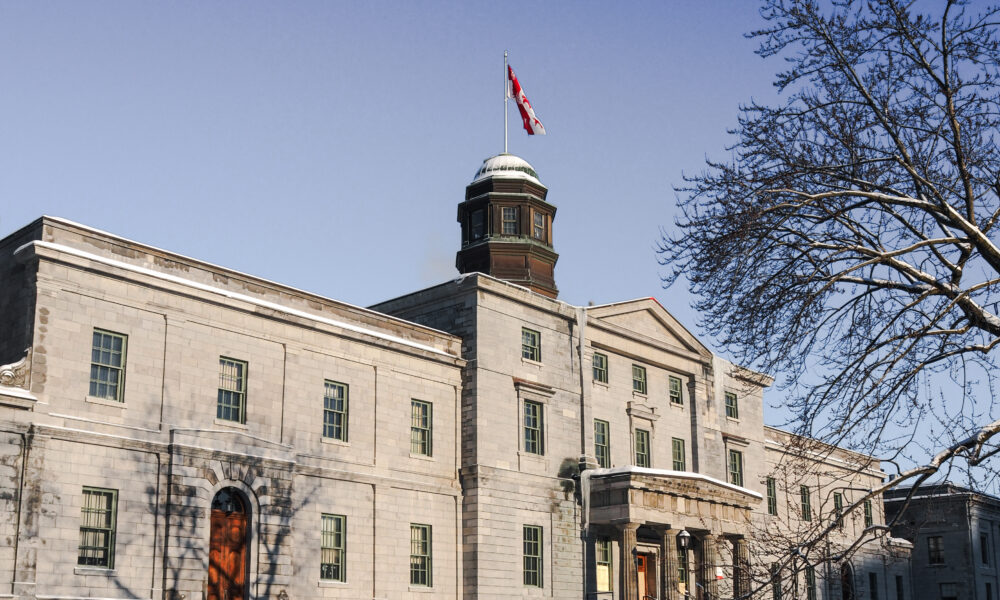McGill’s top executives hosted a virtual town hall on Feb. 7 to discuss the university’s 2024-2025 budget, particularly their strategy to address its deficit. Co-hosts of the event, President and Vice-Chancellor Deep Saini, Provost and Executive Vice-President (Academic) Christopher Manfredi, and Vice-President (Administration and Finance) Fabrice Labeau, laid out their plan to restore McGill’s financial stability. This is the second budget town hall McGill has hosted this academic year, with the first on Nov. 19.
Saini opened the town hall with a frank statement about the financial circumstances the university is facing.
“Our university, as we know, is facing serious financial pressures that originate from many different sources,” Saini said. “Ultimately, these pressures have significant implications for the delivery of McGill’s mission, and our identity as a world-class university [….] Unfortunately, the road ahead will remain extremely difficult for the foreseeable future.”
McGill is currently expected to run a $15 million CAD deficit for the 2024-2025 fiscal year. This deficit would have been closer to $50 million CAD, had the university not implemented a $35 million CAD correction to its budget this past fiscal year.
To balance the university’s budget and restore its long-term financial stability, Manfredi and Labeau announced they will lead a two-phase program called ‘Horizon McGill.’ Phase one involves immediate actions to balance the 2025-2026 budget, and phase two will restructure McGill in the long-run to increase the efficiency of its operations.
A balanced 2025-2026 budget will require a $45 million CAD budget correction which would counter the budget’s expected deficit. Manfredi informed the community that the majority of the budget-balancing will come from reducing salary mass, requiring both academic and administrative layoffs.
“We can delay the filling of [a] select number of vacancies, eliminate overtime, reduce working hours or reduce pay where the employee is willing and where circumstances allow, and also [use] attrition, by not replacing staff who leave the university,” Manfredi stated. “But […] that’s not likely to be enough. In some circumstances, positions will have to be abolished, resulting in the loss of employment. That’s unsettling news.”
The university has assigned individual academic and administrative units a share of the $45 million CAD correction and required them to report by early March on how they plan to implement related cuts. According to Manfredi, this will likely involve cancelling low-enrollment courses and reducing the university’s staff headcount by 250-500 people.
Manfredi identified a combination of causes for McGill’s financial struggles, including a cap on international student admissions, growing tensions between Canada and the United States, an aging population, and restrictions from the provincial government regarding the university’s use of capital funds.
Labeau explained that the university is not considering selling university lands or properties outright to combat its deficit, since such a move would only provide short-term relief from financial hardships whose root causes can only be addressed through restructuring.
Over the next few years, the administrators explained that McGill will aim to improve operational efficiency, eliminate red tape, and join the UniForum program—a practice-sharing forum which will help McGill compare its operations to similar institutions around the world to help identify how the university can improve its financial situation through restructuring.
In a press conference following the town hall, Vice-President (Communications and Institutional Relations) Philippe Gervais told The Tribune that, though there is little students can do to add their input to the upcoming budget, they will be able to play more of a role in phase two of Horizon McGill.
“The longer project that’s going to go over two or three years, of how we’ll restructure, and where I think a lot of the fundamental decisions will be made, [will have] plenty of room for consultation,” Gervais said.
Though Saini stressed that the coming years will be difficult and result in a compression of the university, he expressed that cuts need to be viewed in the context of the university’s long-term objectives.
“Ultimately,” Saini said, “we want to emerge as a stronger McGill, a McGill that is more resilient, a McGill that’s more sustainable, and a McGill that, frankly, is more impactful on a global stage.”







